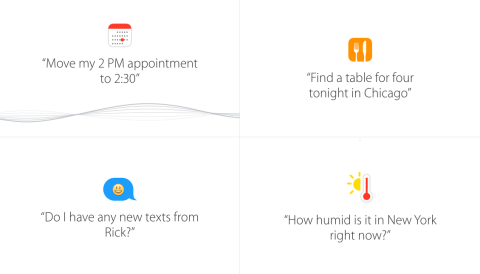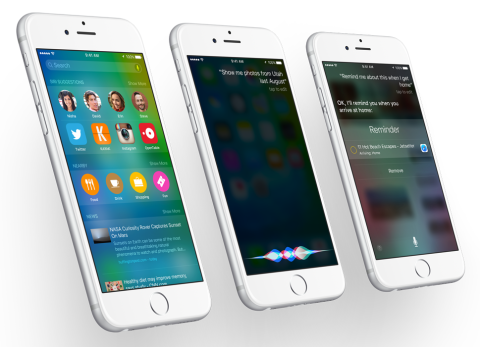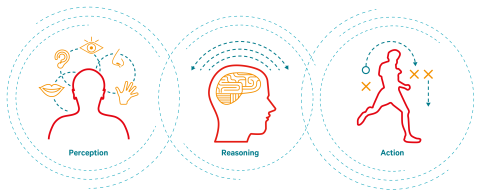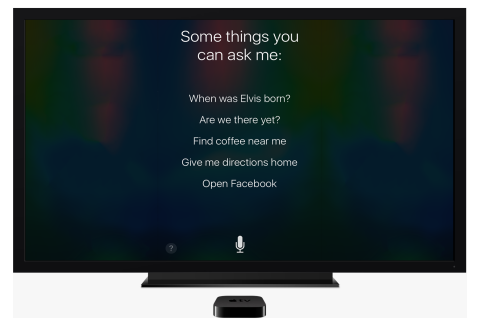Siri is getting some new capabilities in iOS 9, but it’s also up against more competition than ever. We take a look at what the future holds for Apple’s digital assistant…
Siri – short for the Scandinavian name Sigrid, meaning wisdom – is a voice-controlled digital assistant that understands natural spoken language.
Since Siri was first fully introduced with the iPhone 4S in 2011, many competitors in the virtual assistant field have risen. In response, Apple is increasingly moving Siri center-stage and say that in iOS 9 it will be more intelligent than ever. So just how smart is Siri, and what’s in store for the future?
What can Siri do?
Siri’s capabilities are extensive. It integrates with every native iOS app (like Mail, Maps, Messages, Music, and plenty more that don’t begin with M). It’s linked to services like Wikipedia, Yelp and Wolfram Alpha to widen its knowledge base. It can post to social media, convert measurements, check flights, roll virtual dice, and calculate tips – Siri is very good at singular tasks that follow a familiar pattern.
Apple’s SVP of Software Engineering, Craig Federighi, says that “these kinds of intelligent features really make a huge difference” to the iOS user experience. He also revealed at WWDC that Siri has gotten 40% faster and 40% more accurate over the last year, with an industry-leading word error rate of just 5%.
What’s new in iOS 9?
Apple’s next mobile operating system – due this Fall but already available to try out in beta – promises to be more “proactive,” not just answering the questions you ask but also pre-empting the ones you haven’t thought of yet. Siri will learn your routines and offer context-sensitive shortcuts via the lock screen, like the News app at breakfast or Music on the commute to work.
Siri will also power the beefed-up new Search functionality in iOS 9, with the ability to look at the content inside apps – even ones that aren’t installed on the device. In practice this means you can search for, say, “potatoes” or “sunburn” and see search results that deep link straight into the relevant page of a cookbook or first aid app, prompting a download from the App Store if necessary.
In iOS 9 you’ll be able to ask Siri to find photos and videos from a specific time, place or album: “show my karaoke photos from last June.” It will also have a much greater understanding of your music library (including Apple Music): “play the best selling tracks from 1985,” or “play that song from Selma”. Siri will understand the new Transit features in Maps to give you better directions, and can play Vimeo or YouTube videos directly from the search window.
How does the competition hold up?
Although Siri has had a big head-start on the major competitors, intelligent assistants from Google and Microsoft (Cortana, named after the character in the Halo video game series) have caught up fast and even Blackberry has thrown its hat into the ring. Amazon has released a standalone home device called the Echo which offers an always-on Siri-like experience without the need for any kind of visual interface, which has been surprisingly well-received.
In a straight-up battle between Siri, Cortana, Google Now and Blackberry Assistant – conducted impartially by the usually Microsoft-favoring website AAWP – Siri surfaced as a clear winner. The experiment tested the quality of responses to pre-written questions like “what’s my schedule for the rest of the week?” or “where can I buy tires for my car?” and although Siri came out on top, there were large areas of weakness for all four assistants. Despite Apple’s advantage, there is a lot of room for improvement in the field.
Amazon Echo has dreams of being the ship’s computer from Star Trek, while Google Now and Cortana try to provide similarly ubiquitous solutions. The word on everyone’s lips is omnipotence. Each of these virtual assistants wants to know everything and do everything; but this kind of service can only be truly helpful by knowing an awful lot about you.
To that end, Apple is going to great lengths to reassure us that none of Siri’s features are at the expense of customer privacy. At WWDC, Federighi explained that any potentially intrusive features are done entirely on-device, and information that you do store in the cloud won’t be mined for personal data: “we honestly just don’t want to know.” This could give Siri a competitive advantage – sharing personal data tends makes people uncomfortable, and trust is important.
What do the experts think?
Doug Kittlaus, co-founder of Siri, has a new project called Viv Labs – an even more sophisticated virtual assistant, intended as a “global brain” that can teach itself new capabilities. In an interview with WIRED, Kittlaus says he wants to simplify the world by “providing an intelligent interface to everything”, and says that whereas Siri (and most of its virtual contemporaries) can only perform pre-programmed tasks, Viv will be able to learn to perform complex functions Siri could only dream of. That’s the theory, anyway.
Not to be outdone, Facebook is also working on its own “deep learning” engine. Director of A.I. Research Yann LeCun told the New York Times that artificial intelligence is “how we will make sense of all the information that will be out there in the digital world.” He dreams of a world where computers can understand and even exhibit complex emotions: “what are emotions, but registers of things we like or don’t like? You could assign values to those.”
Kayvan Mohajer, founder of Soundhound and more latterly the voice-control developer platform Houndify, sees conversational devices as the inevitable future of computing. He explains to International Business Times that keyboard interfaces are “not how we were born to communicate,” and that voice communication “makes it feel more like you’re interacting with it rather than dealing with it.”
These endeavors don’t directly compete with Siri in the same way Cortana does, but the alternatives discussed by these industry experts could perhaps encourage Apple to develop Siri further than originally planned. Imagine a self-teaching, emotion-feeling, always-on Siri.
What does the future hold?
Federighi notes that Siri has “quietly become incredibly popular,” serving over a billion requests weekly. Meanwhile the rise of Google Now, Microsoft Cortana and Amazon Echo have opened up the world of artificial intelligence to a wider demographic. This level of competition will keep Apple on its toes and can only be good for advancing the field.
Microsoft’s Cortana runs on both desktop and mobile with Windows 10. Google Now appears on Chrome for PC and Mac as well as Android. Amazon Echo is always on, central to the ‘digital living room’. Could Apple follow suit and bring Siri to more than just iOS devices? It already feels at home on the Apple Watch and is rumored to be a feature of the next Apple TV, but OS X support must at least be on the minds of Apple’s development teams.
Once the mobile and desktop markets are saturated, could the industry eventually evolve from wearables and hearables through to thinkables? Perhaps an implanted, symbiotic human-AI hybrid with always-on search functionality deep-linked to our brains? OK, maybe we’re getting carried away with the sci-fi stuff, but it wasn’t long ago that intelligent, talking virtual assistants were only seen in Knight Rider and Iron Man. Now tens of millions worldwide have one living in their pocket.
The potential for an always-available digital assistant who knows you better than you know yourself can’t be far away, and all signs point to Siri being a big part of that movement. Some may worry about the repercussions of granting an artificial intelligence control over their whole life, but if Siri’s success is anything to go by, there are plenty willing to welcome our new robot overlords with open arms.






